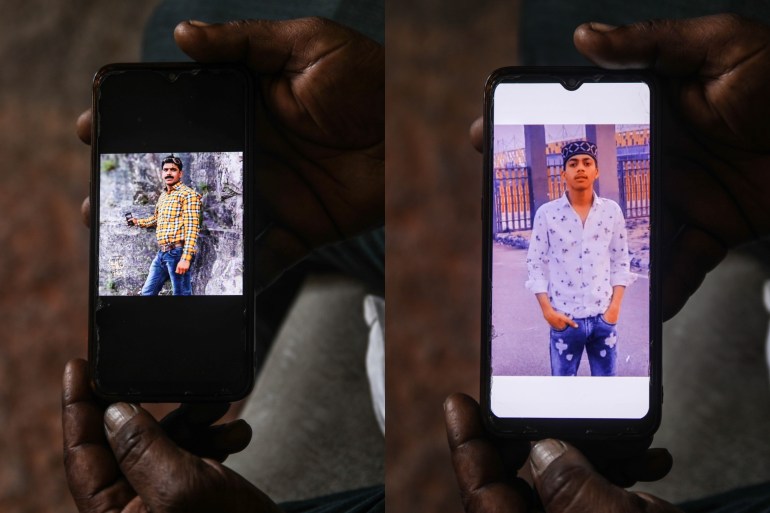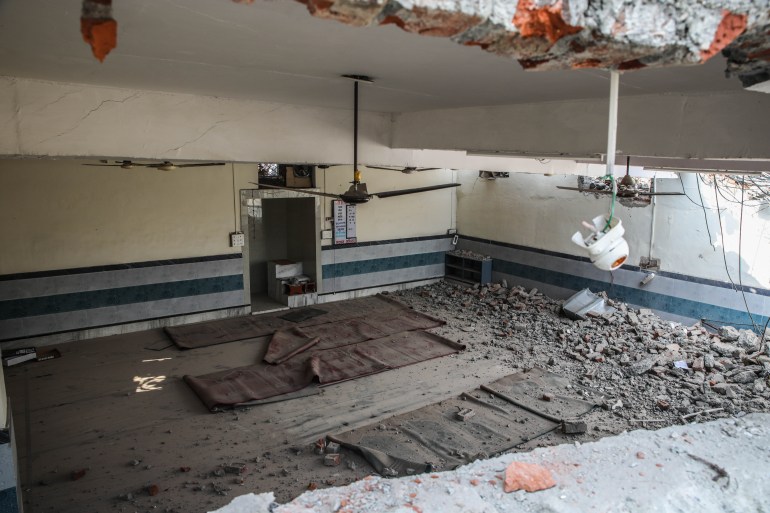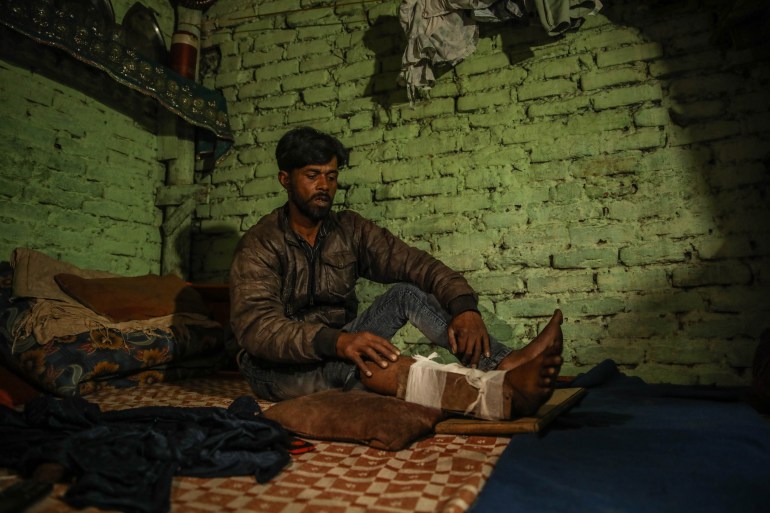‘Killed by police bullets’: Deadly clash scars Muslims in India’s Haldwani
Violence that erupted after a mosque and school were demolished has killed six people and deepened religious divisions.
![A young Muslim boy and girl walk past a hole in the wall of a madrasa demolished in the north Indian city of Haldwani, on February 9, 2024, the day after the demolition [Arbab Ali/Al Jazeera]](/wp-content/uploads/2024/02/HaldwaniAJ_01-1707816087.jpg?resize=770%2C513&quality=80)
Haldwani, India – At about 6:45pm on February 8, Mohammad Arif called his brother Zahid. A mosque and an Islamic school had been razed by government officials in their town of Haldwani in northern India, and violence had broken out. The 52-year-old Arif wanted his brother, seven years younger, to return home immediately from the iron and cement shop he worked in.
Zahid rushed home on his motorbike and parked it outside the house. Unaware that the protest had become violent, Zahid hurried to buy milk for his infant grandchild.
Keep reading
list of 4 items‘We love Taiwan’: Domestic workers hope for more from new President Lai
Cohen admits to stealing and other takeaways from day 19 of Trump’s trial
Iran announces five days of mourning after President Raisi’s death
When Zahid’s 16-year-old middle son Mohammad Anas learned that his father had gone out again, he went looking for him in the cramped, dingy lanes of Haldwani’s Banbhoolpura area, a Muslim ghetto. The police shot the son in the stomach in the lane, and the father in the chest 200 metres along the same road.
Zahid and Anas are among at least six people killed, including five Muslims, in clashes that involved mob violence and police firing. At least two dozen civilians and more than 100 police personnel were injured, several police vehicles were burned and a police station was attacked in the fallout from protests in Haldwani, the latest site of government-led demolitions in India targeting Muslim structures.
The town’s municipal authorities bulldozed the buildings called the Mariyam mosque, which could accommodate 500-600 worshippers, and the Abdul Razzaq Zakariya school in Malik ka Bagicha in Banbhoolpura on February 8, saying that they had been built without permission.
Residents said the mosque and the school – built in 2002 – have been unfairly targeted, despite a court hearing on the matter scheduled on February 14. The Quran, other religious books and prayer mats are still buried under the rubble.

‘Demolition politically motivated’
When municipal authorities, accompanied by the police and bulldozers, came to demolish the mosque and school, only 25-30 women were inside the compound, said 20-year-old Samreen Khanum, from behind her burqa.
They, and other residents who arrived soon afterwards, tried pressing authorities to not demolish the structures, “The Masjid is our Allah’s home. We can’t see it getting Shaheed (martyred),” said Samreen.
But the demolition started at about 4:30pm. According to the police, residents threw stones at them and set vehicles on fire. The police then hurled tear gas shells and baton-charged the protesters to control the violence.
However, the residents say that police lathi-charged (hit with sticks) the protesting women and tear gassed them, angering the protesters and making some resort to arson. Protesters also surrounded the police station. Samreen said she was fasting and fainted during the teargassing. Her sister, Najma Khanum, 21, was also injured in the police melee.
Both sisters feel that the demolition was politically motivated. “Why is it that only our mosques are demolished every time? If they want to remove encroachment they should remove illegal structures like temples and not just a single mosque and madrasa [school] in a Muslim ghetto,” said Najma.
Last month, Indian Prime Minister Narendra Modi inaugurated a Hindu temple in the northern city of Ayodhya, built on the site of a centuries-old Mughal-era mosque that was destroyed by Hindu zealots in 1992.
In 2023, the government of the state of Uttarakhand, where Haldwani is based, said it had demolished more than 300 Muslim shrines within 90 days.
Even the minority cell of the Bharatiya Janata Party, which rules Uttarakhand, where Haldwani is based, and nationally in New Delhi, had protested against plans for the latest demolitions.
“The madrasa is used by poor children and the old offer prayers at the mosque … we are trying very hard to make the minority community get along with our party … Keeping in mind the coming elections and the interest of the party, those structures should not be demolished,” the BJP minority cell, which leads its outreach to Muslims, wrote in a February 3 letter to Chief Minister Pushkar Singh Dhami.
Samreen and Najma are now worried about their 18-year-old brother Mohammad Ayan, who went out to sell vegetables on his cart on February 8 when the violence broke out. Four days later, they have still not found him.

Shoot-on-sight orders, curfew and internet shutdown
“We only know that six people have been killed. We don’t know if it’s our brother or friend. They aren’t letting us near the bodies or allowing us to identify them. Many of the bodies are left unclaimed. They have cut the internet and we can’t even check the names of the killed,” Samreen said.
When Zahid’s eldest son, 22-year-old Mohammad Aman, learned that his father and younger brother had been shot, he and a friend went out to retrieve their bodies. “Even after shooting my brother, policemen beat him with a baton. He attempted to shield his father’s body by lying on it but they beat him with the butt of a rifle,” Aman said.
Zahid had already died when Arif, who lives 500 metres away, arrived at his home, but his nephew was drenched in blood but still breathing. He claims police barred them from taking Anas to hospital. “If they had allowed us to take him to the hospital, my nephew would be alive,” he said, tearing up. The family attempted to stem the flow of blood with cloth and cotton borrowed from neighbours.
While the police claim that their response was driven by violent attacks on them by protesters, the families of many of those killed insist their relatives were not even involved in the protests.
“My father went to buy milk and my brother went to look for him,” said Aman, Zahid’s son who tried to rescue his father and brother. “So why were they killed?”
Following the incident, authorities in Haldwani issued shoot-on-sight orders, imposed a curfew, suspended internet services, closed schools, and banned large gatherings – even for Jummah prayers in congregation.
The next morning, February 9, at about 9am, an ambulance arrived at Zahid’s house to transport the bodies of Zahid and Anas to the Dr Susheela Tiwari Government Hospital, where they were declared dead and taken to the mortuary, where a postmortem was performed on the bodies.
By 10pm, they had been buried in the presence of five family members as well as police officers. During the burial, Arif said that when they went to bury his brother and nephew, they discovered the bodies of another three people killed during the violence that had been buried in unmarked graves. “They (police) did not allow us to film the funeral with our phones. We were only allowed to use the torch lights on our phones,” he claimed.
Guddu Altaf, 47, who runs a carpentry shop near the city’s cemetery, said families of those killed in the violence contacted him to make wooden planks for the graves. “I made planks for six graves … five for people who were shot and one who died of a heart attack during the violence,” he said.
Mob allegedly burns Muslim homes
Some 700 metres away from Zahid’s home, Faeem Qureshi, 30, a goods vehicle driver and father of two children – a daughter aged seven and a son, six – was killed outside his home by some of his own neighbours in Gandhinagar.
The locality is dominated by members of the Valmiki caste, which is near the bottom of Hinduism’s complex caste hierarchy. The Gandhinagar neighbourhood had only eight Muslim homes.
On February 8, a 200-strong Valmiki mob torched Qureshi’s house, mini truck, scooter and bike, sending plumes of black smoke into the sky. Qureshi suffered three bullet wounds and was declared dead on arrival at the hospital, said Javed, his brother.
According to Javed, Qureshi pleaded with the Valmiki mob not to burn his vehicles parked in front of the residence. But the attackers threw petrol bombs and when Qureshi hurried downstairs to douse the flames with a bucket of water, he was shot dead.
The district magistrate of Nainital, Vandana Singh, told reporters that the Haldwani violence incident was not communal. “I request everybody to not make it communal or sensitive,” she said. Haldwani falls under the Nainital district.
However, the victims’ families say the attackers were shouting aggressive slogans linked to Hindu majoritarianism, and hurling abuse against Muslims. Javed alleged that the police stood about 50 metres away from the Valmiki mob and took no action.
Al Jazeera spoke with Mohammad Furqan, 41, the uncle of Mohammad Shaban, 23, a shopkeeper from Machli Bazaar who was allegedly killed in police fire.
“After the demolition, when the riot happened, Shaban closed his shop and while coming home he was shot,” Furqan said. He was declared dead in hospital.
Furqan also said about three dozen policemen were now stationed outside Shaban’s home. “Even we are not permitted inside the house. Police keep harassing us,” he claimed.
Nazir Hussain, 42, owns a tailoring business in Haldwani. On the evening of February 8, the same Valmiki mob that attacked Qureshi also set fire to his home, which is two houses from Qureshi’s. The homes of three of Hussain’s relatives were also torched and looted.
“My family barely survived by climbing onto our neighbour’s terrace. I used to treat my neighbours [Valmiki] like family, but they betrayed us and tried to kill us,” Hussain said, adding that he had suffered a loss of up to 800,000 Indian rupees, or $9,600.

Fear of arrest, demolition
Yunus Raza, 33, lay on a bed in the eastern end of Indira Nagar, a neighbourhood near the railway tracks, in a dark one-bedroom house with unplastered walls and a tin sheet roof. The right leg of his trousers was torn up to the knee and covered in blood. There was an unclean bloodied bandage on his right leg where a bullet had struck him. His six-month-old infant slept nearby on his side.
Raza had gone out to buy milk for his baby on the evening of February 8. But at the dairy shop, he got caught up in a stampede that he said began when police started baton-charging people. He was shot in the right leg. “The police shot me, and I fell unconscious. People picked me up and took me home,” he said.
“I am poor. I cannot afford to go to a private hospital and there are policemen at the government hospital,” he said.
Though Raza insists he was not a part of the protests against the police, law enforcement agencies in India have a long history of disproportionately arresting Muslim men after any clashes – including people unrelated to the actual violence. At least 30 people have been taken into custody so far since the clashes, and witnesses say all arrests so far have been made in Muslim-dominated neighbourhoods.
“If I go out, they will arrest me and throw me in jail,” Raza said.
His family faces an uncertain future as their sole earner is bedridden for the next few months. “How will I feed my children?” asked Raza, a construction labourer in Haldwani.
Dhami, Uttarakhand’s chief minister, said the government would take the “strictest action against rioters and miscreants”.
“Police have been given clear instructions to deal strictly with unruly elements,” he said in a statement. “Every rioter who indulged in arson and stone pelting is being identified. No miscreant who disturbs harmony and peace will be spared.”
But while Muslims have been the principal victims of the Haldwani violence, the community fears that they might be the targets of action by Dhami’s government too.
The atmosphere of distrust between Haldwani’s authorities and the town’s Muslims has a history.
In January last year, widespread protests erupted in the town after authorities ordered the demolition of nearly 4,000 Muslim homes that had allegedly encroached on land owned by the state-run railways. The drive was stayed by the Supreme Court, which said 50,000 people “cannot be uprooted overnight”.
Guddu Ansari, 36, a blacksmith and resident of Malik ka Bagicha, a smaller neighbourhood where the mosque and madrasa were located, fears that now the government might send bulldozers to demolish their homes as well.
Dhami announced on Monday that his government plans to construct a police station on the land where the school and mosque stood.
Rights groups have in the past accused the BJP of using bulldozers to illegally demolish the homes and businesses of people accused of violence.
In two reports published together this week, the human rights group Amnesty International documented the “punitive” demolition of at least 128 Muslim properties from April to June 2022, rendering at least 617 people either homeless or without livelihoods.
According to the police, 30 people have been arrested so far and three FIRs (police complaints) have been lodged against 5,000 unidentified people.
“Nobody wants to talk; everyone is terrified,” said Javed Siddique, a prominent local politician who was arrested by authorities just hours after speaking with Al Jazeera.
Al Jazeera contacted Nainital’s Senior Superintendent of Police, Prahlad Narayan Meena about the allegations levelled against police but received no response. Al Jazeera also sought comment from the district magistrate of Nainital, Singh, but is yet to receive any.
Back at home, Arif said he was unwilling to file a complaint over the killings of his brother and nephew. “Who do we file the complaint against? The police? My brother and nephew were both killed by police bullets. There is no justice here. They are treating us unjustly because we are Muslim,” he said.